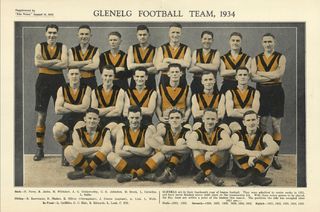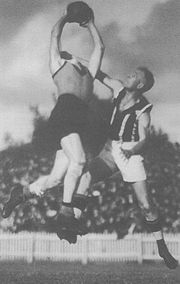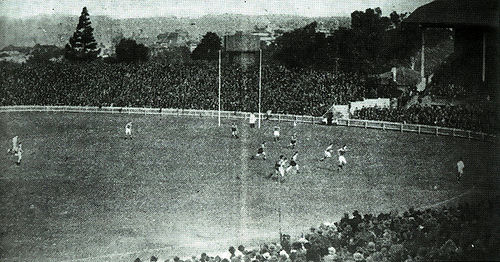GLENELG 1934 PREMIERS
WINS THRILLING MATCH BY NINE POINTS
Port Adelaide Unable To Match Glenelg's Great Pace
TEAMS LEVEL IN LAST QUARTER
BY ROVER
Setting the pace from the start, giving Port Adelaide little chance to drop into the machine-like system which had established is as firm favorite for the 1934 title, and beating off a strong challenge in the last few minutes, Glenelg brilliantly won by nine points the League grand Final and the premiership, at the Adelaide Oval on Saturday.
It was one of the most thrilling matches in the memory of any of the 30,045 people who witnessed it. Fought at a killing pace, the players were forced to endure a more grueling contest than they had probably ever experienced. Having set the speed, Glenelg maintained it in astonishing fashion, clapping on even greater pace when challenged by Port Adelaide, whose efforts to produce the cool, systematic football which had been a feature of its play in earlier matches, were obviously upset by the dash and verve of the opposition.
A remarkable feature of the match, and indicative of the determination of the winning team, any Port goal would immediately be answered by a similar score by Glenelg. By this means not only did Glenelg hold a slender lead practically throughout the game, but it caused Port Adelaide's early sang-froid to give way to concern, and finally to panic in the closing stages, when with the last few minutes ticking away its fiercest efforts could not bring the goal which would give it the lead. The teams were level a few minutes before the finish, and for a few seconds Port seemed to have the grip of the game for which it had striven for more than three quarters, but before freak marking by Johnstone and another surge of fierce determination by the Glenelg team generally, Port quailed, and was beaten.
The progressive scores are an excellent indication of the game. Glenelg's speed and new-found pugnacity is reflected in the fact that Port Adelaide, after scoring the first goal of the day did not thereafter hold the lead at any stage, though on several occasions it drew to within striking distance, only to see Glenelg scoot away again. Half-way through the first quarter the scores were level at 2.2. but Glenelg drew away to a lead of three goals shortly after the second quarter began, and after exciting goal for goal exchanges, increased its advantage to more than four goals shortly before half time.
It was at this stage that Port Adelaide threw away, by laxity in kicking in the forward-lines, a golden opportunity to at least overhaul Glenelg. Its last five kicks at goal before half time and its first one on the resumption brought points-six behinds in a disappointing row. Glenelg's reply was to take its score from 9.8 to 13.8 in four scoring shots. Port was left apparently hopelessly behind, and it entered the last quarter with a deficit of nearly three goals.
Port's Challenge
Two goals early in the fourth term brought the crowd to its feet, the scores then being-Port Adelaide 13.17, Glenelg 16. 10 - a difference of only five points - but as it- happened throughout the match, Glenelg responded fiercely, a goal and two behinds putting the scores out of touch again.
Johnston, who was playing magnificently in the view of the fact that he had an injured leg, rose to great heights, literally and metaphorically, dominating the ruck and knocking the ball into open spaces with powerful punches.
Excitement was intense as Port fought to regain a challenging position. McFarlane, brought into the side from the University team in Amateur League, marked brilliantly in the Port half-back line, and, with defeat staring them in the face, every Port player summoned reserves of energy he did not know he possessed, to beat back Glenelg attacks and to get the ball forward.
Dermody's dashing play at centre wing- he literally ran himself into the ground in his lion-hearted effort-was ultimately rewarded by a goal from Prideaux. Twice repelled, Port again sent in by Dermody, scored another goal by Quinn. This made the scores level.
The tenseness of the excitement was almost painful as the ball was bounced in midfield. Goldsworthy, who at centre half-forward had been a leading figure in the Glenelg side throughout the match, came out almost to centre to get the ball and from him it flashed from man to man until Johnston-playing a match-winning quarter-soared feet above the pack in the goal mouth to mark and kick the goal which restored the lead to Glenelg. The crowd, definitely pro-Glenelg, was hysterically delighted when Owens capped another goal.
The players of both sides were palpably exhausted. Physically "done," the nervous tension kept them on their toes, and it was not at all surprising that frayed tempers found an outlet in two or three outbursts of "temperament" on the part of disappointed Port Adelaide players. This display of feeling, however, played havoc with the side's prospects, for by that time Quinn had scored another goal for Port, making the difference on six points, but Port had come to the end of its tether, and Glenelg made the game safe by scoring behinds, the first of which was as good as a goal to it.
Strain On Players
Immediately the bell rang. Players all but collapsed in several parts of the ground. Dermody was "all in," and so were many players of both sides as they limped painfully off the ground. The gateman found difficulty in, restraining the crowd from rushing on to ground to lionise the Glenelg players. Bruce McGregor (coach of Glenelg) was beside himself with excitement, and, pouncing upon Colyer (Glenelg rover), carried him in his arms, delightfully hugging him. Other players, as much for the additional support, as felicitation, walked with arms about each other from the ground.



